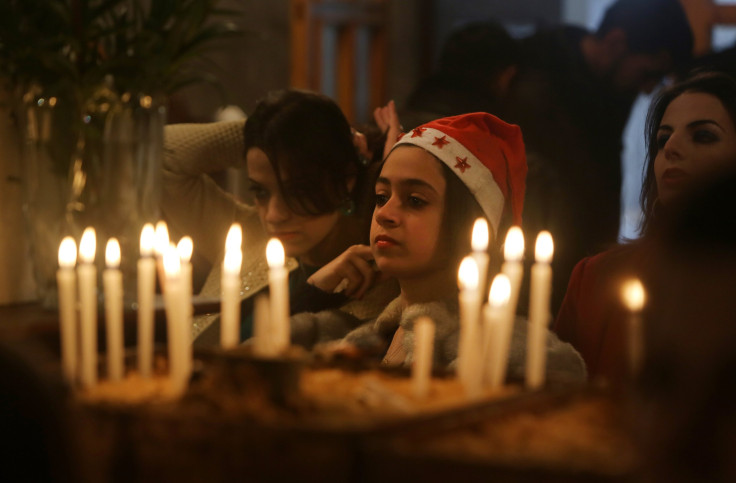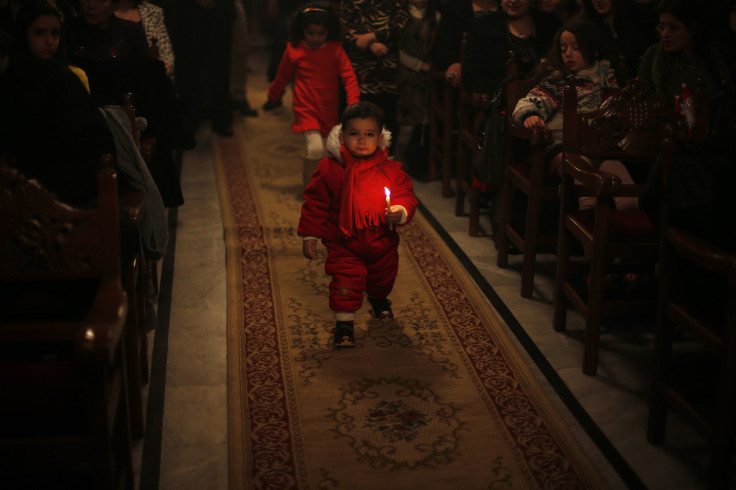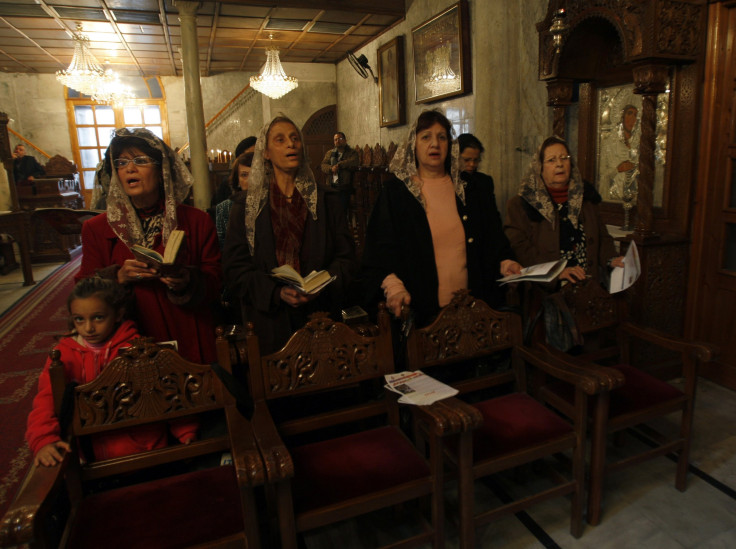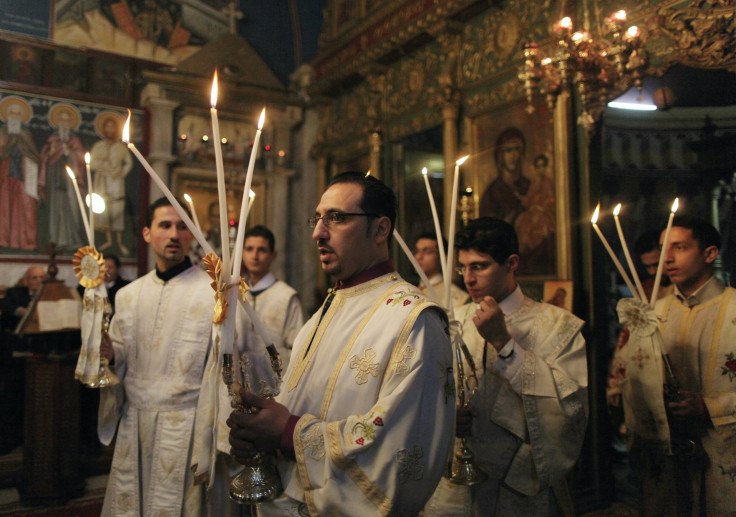As Christmas Looms, Gaza's Fading Christian Community Eyes Life Outside Besieged Palestinian Territory

Hundreds of Christian Palestinians have received rare, temporary permission to travel outside the besieged Gaza Strip this holiday season, and for many, a permit to leave might be their ticket to a new life. While most will spend Christmas with relatives in the West Bank, Israel or abroad, before returning home, some will also leave Gaza for good in something of an exodus.
"It gives Gazan Christians a fresh breeze of freedom in the sense that they can get out of that big jail called the Gaza Strip," said the Rev. Alex Awad, the former dean of the Bethlehem Bible College in the West Bank, who has worked in Gaza. "But every Christmas, I know of Christians who leave Gaza to celebrate and they never return back to the Gaza Strip, which means the final death of the Christian community continues."
In the last few years, most of the Gaza Strip's Christian population has fled as an Israeli-imposed blockade has worsened conditions there. Many have relocated to the Palestinian West Bank, and among Christians still in Gaza, there's an acute fear that the community could be nearing its end. Ten years ago, there were some 3,000 Palestinian Christians in Gaza; today, just a little more than 1,000 remain.

The prolonged blockade of Gaza has strangled the territory's economy and has pushed the unemployment rate to the highest in the world. The World Bank has warned that the economy is on the "verge of collapse" and the coastal territory could be "unlivable" by 2020, according to the United Nations. Israeli officials insist the blockade — which severely hinders the movement of people in addition to goods in and out of Gaza — is necessary to prevent Palestinian militants from obtaining materials that could be used to build weapons. But Palestinians and human rights groups say it has unfairly hurt Gaza's civilians, prompting a massive crisis, as more than 80 percent of Palestinians now rely on humanitarian aid.
"The blockade is one issue, and also the threat of another Israeli attack," said Awad, who has moved to the U.S. and is affiliated with the United Methodist Church. "Who would want to endure Israeli bombardments in Gaza every 12 months or every two years, to live that nightmare of not knowing whether you are going to live through the bombardment or not?"
Many youth were already pursuing better jobs and safer futures overseas. For Christian Palestinians, permission to visit the West Bank or travel abroad during Christmas could be their rare opportunity out.
Since the current Hamas government was voted into power in Gaza in 2006, Israel has granted permission to leave to only a fraction of Gaza residents who apply. Permission to pass through the Israeli-controlled Erez border crossing in Gaza’s north is usually only granted under extenuating circumstances, like need for medical treatment or if a student can produce proof of acceptance into an educational institution abroad.
Although most of Palestinian society is Muslim, Arab Christians have been part of the region's fabric since the earliest days of the faith. They work all sorts of occupations — from doctors to teachers to merchants — and they're considered well-educated and relatively wealthy. Most Palestinian Christians — about 52,000 — live in the West Bank. In both the West Bank and Gaza, they operate their own schools, and many are attended by Muslims, as well. There are three official churches in Gaza, each representing a different denomination, but Awad said many also start up Bible groups in their homes.
"People are very worried" about the survival of the community, said David Wildman, the executive secretary for human rights in the Middle East for the United Methodist Church. He has made several trips to Gaza and has contacts with Christians on the ground there. "If you're a parent and your children are in their 20s and their life is ahead of them, what opportunity do they have? And if they have a chance to study overseas, do you say yes or no? The future of the community is the decision of each individual in each family."

While many Christian Palestinians say their problems stem from the same issues facing all Palestinians — namely, the ongoing political conflict with Israel — the community has also been subjected to several attacks in recent years, as hard-line militant groups have gained a foothold in Palestinian territories. In 2009, a Gaza church was bombed by al Qaeda-influenced militants, but the incident was quickly condemned by government officials.
Gaza is ruled by the militant Hamas movement, and while the movement has been condemned by many Western governments for its terrorist attacks on Israeli civilians, experts said the militant group has protected the Christian population. Muslim officials and religious leaders have visited Christians in expressions of solidarity, and Wildman said he believed this Christmas, too, would be a time for Muslims to show support for the Christian community.
“There will be visits by some of the leadership in the Muslim community to extend hospitality to their Christian neighbors during their feasts, in the same way Christians would do that during Eid to Muslims,” Wildman said.
Although tensions between Muslim and Christian communities have sporadically heightened over the years, particularly at politically tense times, Gary Burge, a professor of the New Testament at Wheaton College in suburban Chicago, who has written extensively on Arab Christians, said Palestinian Christians have generally seen themselves as part of the Palestinian nation. They've also shared many of the same political grievances, he said.

“Just like in any community, you’re going to have a degree of tensions, but the overall commitment to ending the occupation is bigger than any minor tensions,” said Burge, who has primarily researched Palestinians in the West Bank. “There’s a surprising unity among Palestinians about one cause, which is always the same, and that is ending the occupation ... Palestinian Christians feel as deeply as do Muslim Palestinians.”
In recent years, Palestinian Christians have pushed to have their plight heard by the wider Christian world. A number of Christian Palestinian groups have sprung up promoting Palestinian rights in the West Bank, but in general, Christians in the U.S. are often the most fervent supporters of Israel's government.
"They feel misunderstood. It's hard for them to realize that American Christians don't know they exist, so they feel invisible to the Western church," Burge said. "In the last 15 years, though, great strides have been made to make them visible, and there's sort of a change in discourse today."
In June, the Vatican formally recognized Palestinian statehood, and the Presbyterian Church in the U.S. voted to divest from three companies that they said supplied Israel equipment to maintain its occupation of Palestinian territories.
Wildman said that even as the Christian community in Gaza has shrunk, and even as they are concerned their generation of Palestinian Christians in Gaza could be the last, there seems to remain a degree of optimism — one that he said emanated from their faith.
"I think there is both a desperation and a hope at the same time," he said. "The Christmas story in some sense reminds the community that the birth of a child hardly seems something to threaten an empire and turn the world around, yet that is precisely the story. The birth of a child makes all the difference."
© Copyright IBTimes 2024. All rights reserved.





















